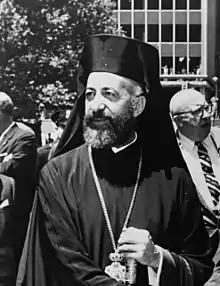Greek Cypriot nationalism
Greek Cypriot nationalism, also known as Cypriot Hellenism is an ethnic nationalism emphasising Greekness of the Cypriot nation, whilst contrasting with Greek nationalism which aspires to integrate Cyprus into Greece as its main and number one objective. Having abandoned the idea of Enosis (unification of Cyprus with Greece), Greek Cypriot nationalists now have the aim of a Greek Cypriot-controlled state with close relations to Greece, the "motherland".[1] Variants of the nationalism have been espoused by the centre-right Democratic Party (DIKO), the right-wing New Horizons, Socialists (EDEK), the Greek Orthodox Church of Cyprus, and nationalist elements within the centre-right Democratic Rally (DISY).[1]
The Turkish invasion of Cyprus in 1974 led to an initial marginalisation of Greek Cypriot nationalism and the consequent rise of Cypriotism, in opposition to traditional Greek nationalism;[2] however, the 1981 election of Andreas Papandreou as Prime Minister of Greece with his policies of "nationalising" the Cyprus problem and his February 1982 visit to Cyprus led to a renewal of Greek Cypriot nationalism.[3] In November 1993, Andreas Papandreou and President of Cyprus Glafcos Clerides announced the merging of Greek and Cypriot foreign and defense policies, under a new "Joint Defense Space Doctrine", and in 2004 Cyprus became a member of the European Union, which was seen as the best possible alternative to Enosis (Turkish Cypriot leader Rauf Denktaş called it "Enosis through the back door").[4]
Greek Cypriot nationalism and Cypriotism contrasts, with opposing views on Cyprus dispute causes and solution perspectives, corresponding to right-left political opposition.[2] The slogan for Greek Cypriot nationalism is "Cyprus belongs to Greece", while for Cypriotism it is "Cyprus belongs to its people".[2]
History

The Ottoman Empire ceded administration of Cyprus to the United Kingdom with the secret Cyprus Convention (1878). During World War I, the British formally annexed Cyprus as a crown colony. The 1950 referendum on unification with Greece, organized by the Orthodox Church, with only Greek Cypriot vote eligibility, ended with 96% approval.[5] Greece appealed to the UN in 1954 to apply the right for self-determination on Cyprus.[6] The Cypriot intercommunal violence led UN peacekeeping establishment on the island. The London-Zürich Agreements led to the independence of Cyprus, proclaimed on 16 August 1960. Several coups were staged by Orthodox bishops against Makarios III in March 1972 to July 1973.
The 1974 Cypriot coup d'état, staged by the Cypriot National Guard and Greek military junta, was successful, but short-lived, as it sparked the Turkish invasion of Cyprus (1974) that led to the fall of the junta and the Turkish occupation of 36.2% of Cyprus' territory. In 1983, the "Turkish Republic of Northern Cyprus" was unilaterally declared, but has so far failed to achieve international recognition (it is recognised only by Turkey), and has been under a severe international embargo.
Political parties
- Active
- Democratic Rally (DISY), centre-right, strongly pro-European and Atlanticist party that includes both Greek-Cypriot nationalist as well as moderate factions that supported the Annan Plan of 2004 , 18/56 seats
- Democratic Party (DIKO), centrist, founded in 1976, 9/56 seats
- Movement for Social Democracy (EDEK), left-wing in economic theory and in most social policies but nationalist and hard-line in the Cyprus issue, founded in 1969, 3/56 seats
- Solidarity Movement, founded in 2016, 3/56 seats
- National Popular Front (ELAM), founded in 2008, 2/56 seats (also strongly Greek nationalist and pro-Enosis)
- Defunct
- Patriotic Front, active 1959–69, split into United Party, Progressive Front, Progressive Party and Democratic National Party
- Progressive Front, active 1970–76, merged into Democratic Rally
- Democratic National Party, active 1968–77, merged into Democratic Rally
- United Party, active 1969–76, split into Democratic Rally and Democratic Party
- European Party, active 2005–15, merged into Solidarity Movement
See also
References
- Hay & Menon 2007, p. 125.
- Madianou 2012, p. 40.
- Chrysostomos Pericleous, Cyprus Referendum: A Divided Island and the Challenge of the Annan Plan, pp.117-121, 2009
- Christalla Yakinthou, Political Settlements in Divided Societies: Consociationalism and Cyprus, p.203, 2009, quoting Rauf Denktaş
- Borowiec 2000, p. 30.
- Borowiec 2000, pp. 30–31.
Sources
- Colin Hay; Anand Menon (18 January 2007). European Politics. OUP Oxford. pp. 125–. ISBN 978-0-19-928428-3.
- Mirca Madianou (12 November 2012). Mediating the Nation. Routledge. pp. 40–. ISBN 978-1-136-61105-6.
- Alexios Alecou (16 June 2016). Communism and Nationalism in Postwar Cyprus, 1945-1955: Politics and Ideologies Under British Rule. Springer. pp. 84–. ISBN 978-3-319-29209-0.
- Andrew Borowiec (2000). Cyprus: A Troubled Island. Greenwood Publishing Group. pp. 30–. ISBN 978-0-275-96533-4.